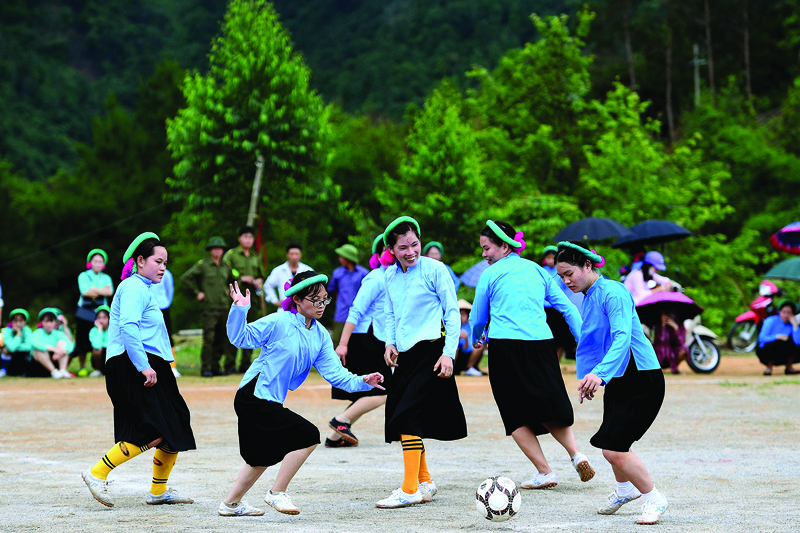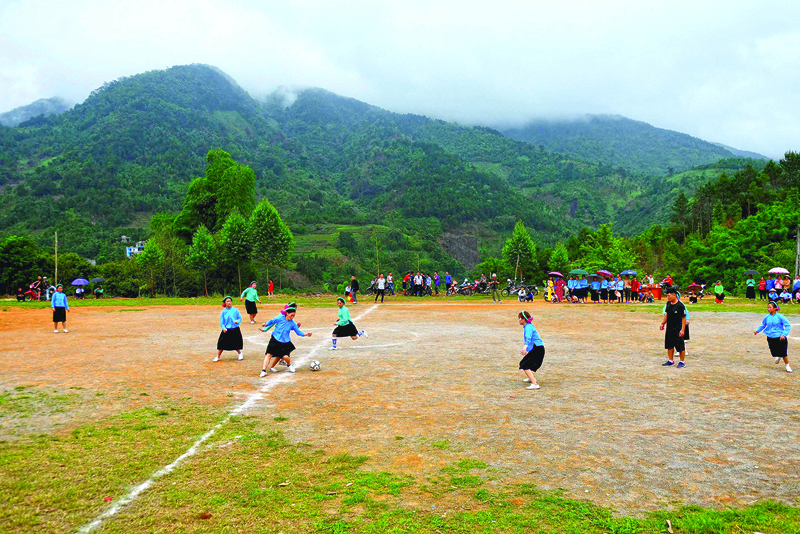 Ethnic San Chi women dressed in traditional costumes play a friendly football match as part of the Soong Co festival celebrations in northern Vietnam's Quang Ninh province. — AFP photos
Ethnic San Chi women dressed in traditional costumes play a friendly football match as part of the Soong Co festival celebrations in northern Vietnam's Quang Ninh province. — AFP photosLegs stiff from long days in the rice terraces of northern Vietnam, scores of female farmers dressed in colorful cloth headbands and skirts gather on a gravel pitch for a game of football. The all-female squads of Huc Dong commune, a mountainous village only 40 kilometers from the Chinese border, have little time to practice and may spend months away from the sport when it's time to tend their crops. But the commitment of the women, who hail from the San Chi ethnic minority group, has earned them respect-plus a little money and fame-in football-mad Vietnam.
Since they began playing in 2016, the women have featured regularly in national press and across social media. But they are far from the only success story in women's football in Vietnam, with the national side multiple South East Asian championship winners. Trying to catch a pass from her teammate, striker May Thi Kim bumps against her competition as she aims for the goal on the community's gravel hilltop stadium overlooking the paddy and bamboo-covered valley.
Her team from Mo Tuc village is facing off against friends from neighboring Luc Ngu in a sports event that is part of the traditional Soong Co festival. As the team dribbles the ball closer to the goalposts, spectators-many of whom are their husbands, children and tourists-cheer the women on. "I used to watch football on TV," Kim, 29, told AFP, recalling the beginnings of the team five years ago. "I told the youth union they must let us women play."
Skirts shortened, shirts loosened
Kim and her fellow players in Huc Dong commune -- 14 in all across two teams-play in black skirts, long-sleeved blue shirts and headbands that have been part of their traditional dress for generations. "There is no difference playing football in either the traditional clothes or sportswear," Kim told AFP before the match.
That said, their skirts have been shortened, shirts loosened-and some of the women play with colourful long football socks. Midfielder La Thi Thao, 15, says she might be more comfortable in regular shorts and T-shirt, but is happy to show off the clothing of her tiny community, which numbers just over 2,000. It helps "people, including tourists, understand us better", she said.
'It hurt every muscle'
All the players in Huc Dong, including Kim, make a living from hard grind on the terraced paddy fields and in the forests, where they grow cinnamon, star anise and pine trees. Their step count climbs into the tens of thousands each day as they traverse hills and navigate rocky streams. But although strong, the women did not have the physical agility at the outset that football demands. "When we first started, it hurt every muscle," Kim said, admitting they had very little time to train due to the combined pressures of farming and housework. Coach May A Cang has trained them hard to improve their flexibility, asking the women to run regularly to limber up their muscles.
It was tough work at first, with the women soaking their legs in warm salted water and medicinal leaves for pain relief-but gradually their bodies adapted to the training. While Cang has taken on a coaching role, he admits that even he was initially hesitant when his wife, a squad member, wanted to join the team. "I thought her playing could hurt her legs and then she could not go to the field to work," he said. "But she told me she would train and would know how to play properly." The women believe they have proved their doubters wrong-some have even transferred their passion on to their daughters. "Even if it hurts, we are ok to take it for our love of football," Kim said. - AFP










